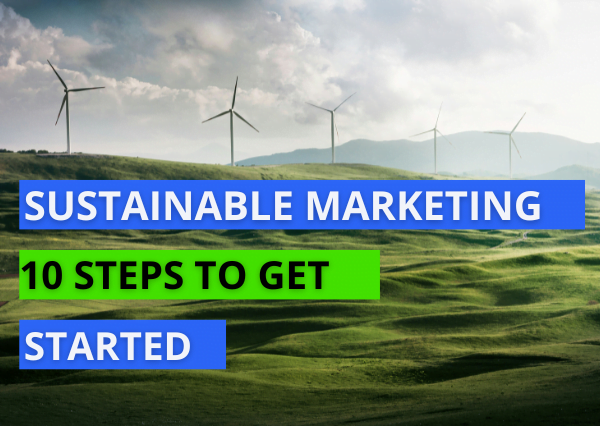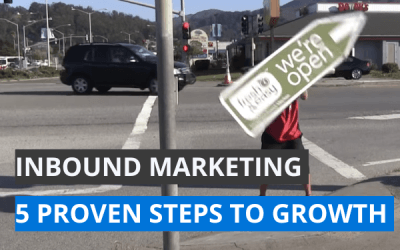Today, it’s really important for consumers that the businesses they use care about the environment and society. To build on that, studies have found that most consumers are willing to change their buying habits to be more environmentally friendly. So, if your competitor is putting in the effort to be sustainable and you’re not, you’ll likely lose sales.

Business is no longer just about selling products; it’s about selling them in a way that’s good for the planet and people. As consumers increasingly want to buy things from companies that care about these things, businesses are starting to use sustainable marketing strategies to promote their business and sell more.
Table of Contents
What Sustainable Marketing Really Means
Sustainable marketing is a modern way businesses approach selling their products and services. It’s not just about making money; it’s about doing it in a way that’s good for the environment and people. This kind of marketing thinks about the whole process of making and selling something and ensuring it’s done responsibly.
Think Ahead and Stay Consistent
Sustainable marketing isn’t just a quick thing companies do. It’s about planning for the future and always considering how their actions affect the environment and people. They need to keep doing this all the time in everything they do and improving along the way.
The more you do to demonstrate that you do business in a sustainable way and that you’re taking steps to continually improve, the better this is for your marketing message and your bottom line.
Making Sustainability Part of the Business
In using a sustainable marketing strategy, companies pay a lot of attention to how they get their materials, how they make their products, and how they sell them. They try to do all of this without harming the environment and while being fair to the people involved. It’s about being honest and open with customers, letting them know what the company is doing to be more sustainable.
For example, this could be offsetting carbon, driving sustainable vehicles, minimising packaging, recycling old products and components or even designing new products that utilise sustainable materials and processes.
As part of the open and honest approach, if there are things you don’t currently do that you know you could do better, tell people how you are taking steps to improve.
Focusing on What Customers Want and Value
Sustainable marketing is all about paying attention to what customers care about. Today, many customers worry about how their purchases affect the world. So, businesses need to offer products that are good for the planet, society, and customers.
Special care should be taken to take note of where products are manufactured, the conditions that the workers operate under and the source of raw materials and energy used to produce the products.
The more you can demonstrate that you care about the whole of your supply chain, the more customers will come on board to your mission and pick you over a competitor.
How to Do Sustainable Marketing Well
Learning from Others
Some companies are already doing great with sustainable marketing. For example, Patagonia gives money to help the environment, Smol makes cleaning products that use less plastic, and Ecologi lets people and businesses plant trees.
Take a look at leaders in your niche and make a note of what they’re doing that you’re not. Then, work out how you can better what they’re doing.
10 Steps to Get Started With Your Sustainable Marketing Strategy
To get started with sustainable marketing, you can take these steps:
- Look at What You’re Doing Now: First, check out how your business is currently running. See where you might be harming the environment or not being as eco-friendly as you could be. This could be how much energy you use, how you handle waste, or where you get your materials from.
- Set Goals for Being Green: Decide what being sustainable means for your business. Make goals that are clear and that you can actually achieve. These goals could be things like using less energy, reducing waste, or treating workers fairly.
- Plan Your Green Marketing: Your marketing should match your green goals. This means when you’re advertising your products or services, talk about how they’re good for the planet or people. Be honest about what you’re doing to be more sustainable.
- Make Your Products Better for the Planet: Look for ways to make what you sell more eco-friendly. This could mean using recycled materials, making sure they use less energy, or changing the packaging to create less waste.
- Teach Your Customers About Being Green: Use your ads and social media to teach people about why being eco-friendly is important. Share stories about what your business is doing to help the planet.
- Work with Other Green Businesses: Team up with other companies that care about the environment. This can make your business look more trustworthy and can give you new ideas.
- Get Official Green Certifications: Try to get special labels or certifications that show your products are eco-friendly. This can make customers trust you more.
- Keep Track of Your Progress: Regularly check how well you’re doing at reaching your green goals. Share this with your customers and employees. Being open, even when things are tough, can make people trust your brand more.
- Listen to Feedback and Change When Needed: Be open to what customers and others say about your green efforts. Use their ideas to keep getting better.
- Be Green Inside Your Business Too: Make sure your own office or workplace is also eco-friendly. This can mean training your employees about sustainability or setting up rules that help the environment.
By following these steps, a business can start marketing in a way that’s good for the environment and society. This can help build a brand that people who care about the planet will support.
Examples of Other Companies Doing It Right
SunPower: Specialising in solar panels and solar energy solutions, SunPower’s marketing focuses on the efficiency and durability of their products. They emphasise how their high-quality solar panels help customers reduce their carbon footprint and save on energy costs over time.
First Solar: As a leading global provider of comprehensive photovoltaic (PV) solar solutions, First Solar focuses its marketing on its thin-film solar panel technology, emphasising its low environmental impact and high efficiency. They also highlight their responsible end-of-life panel recycling program.
Ohme: effectively employs sustainable marketing by emphasizing the eco-friendly aspects of their smart EV chargers and educating consumers about sustainable transportation through their website, social media, and partnerships with green initiatives. Their approach highlights the environmental benefits of their products and aligns them with the broader movement towards cleaner, renewable energy and electric vehicles.
Octopus Energy: Effectively markets its commitment to sustainability by focusing on providing 100% renewable electricity and transparently communicating about its energy sourcing and environmental impact. They engage customers through innovative tariffs, educational content on renewable energy, and partnerships that support global sustainability efforts.

Wrapping Up
Sustainable marketing is a great way for businesses to start to think about more than just making money. However, having a robust, sustainable marketing strategy can help you make more money by attracting consumers from your competitors.
Sustainable marketing ensures that businesses also take care of the planet and its inhabitants when they sell their products and services. This means when a company makes or sells something, they think about how it will affect the environment and people’s lives. They try to do things that are good for the environment, like using materials that don’t harm nature or making sure their products are made in a fair way.
Nowadays, many people who buy things care about the environment and want to ensure they’re not hurting it with their purchases. So, when businesses use sustainable marketing, they’re not just helping the earth; they’re also making their customers feel good about what they’re buying. This is because people like to know that the stuff they buy is eco-friendly and made in a way that’s fair to everyone.
Sustainable marketing isn’t just about selling more; it’s about positively impacting the world. It’s a way for businesses to show they care about more than just profits. They show they care about keeping our planet healthy and treating people well.
The future of marketing is all about being green and responsible. Sustainable marketing leads this change, showing that you can run a successful business and still do good things for the world. It’s a big step forward for both businesses and customers, creating a better world where what we buy and sell is good for everyone.
If you want to ramp up your sustainable marketing strategy to attract new customers, nurture them with your content and convert them into paying clients, then why not get in touch with us and find out where you’re leaving money on the table?





0 Comments